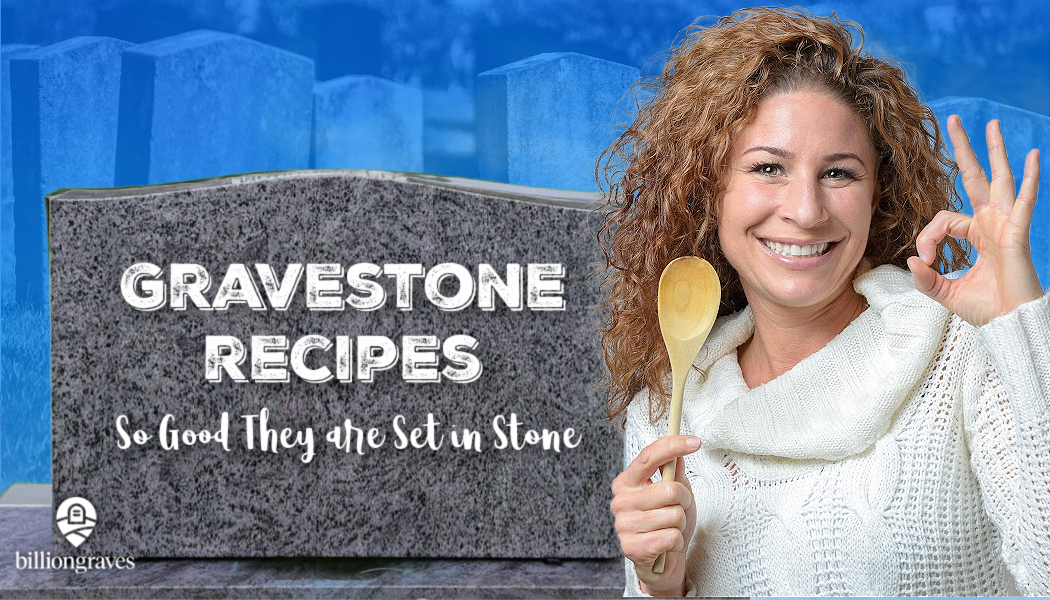Gravestone recipes . . . so good that they are set in stone! When a recipe is important enough to living family members that they want it preserved on a tombstone, it must have been absolutely delicious! Or perhaps the recipe is connected with some very special time spent with the departed loved one.
Food often elicits some of our strongest memories. One quick taste – or even smell – of a family favorite can bring on a rush of emotions. And those memories and emotions are part of what make us feel connected to our ancestors.
Remembering Grandma’s Cooking

Family birthday parties wouldn’t have been the same without my paternal grandmother’s chocolate cakes with whipping cream and bananas between the layers.
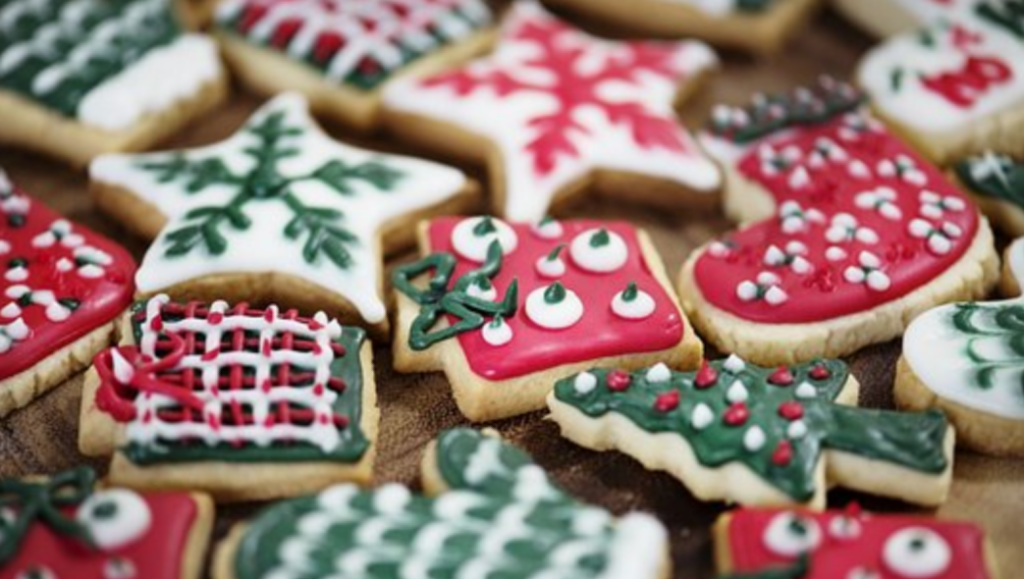
Christmas wouldn’t have felt like Christmas without her huge trays of homemade cookies. She started making them in October and put them in tins in the freezer, only to have them magically reappear for the holidays.

My maternal grandmother used spices that she had purchased on a trip to India to make amazing chutneys that could make pot roast melt in your mouth.

And she canned everything from peaches to pickles, making each bottle look like a work of art.
________________________________
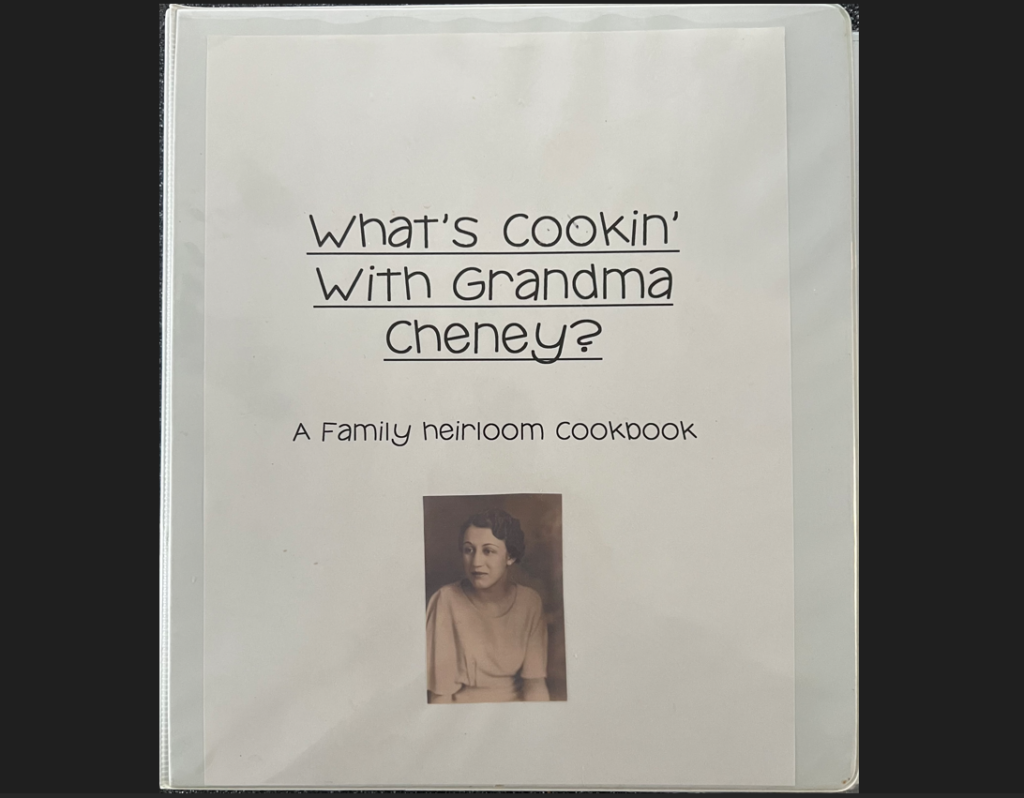
You may choose to preserve your ancestor’s recipes in a binder as a cookbook and give one to each family member.
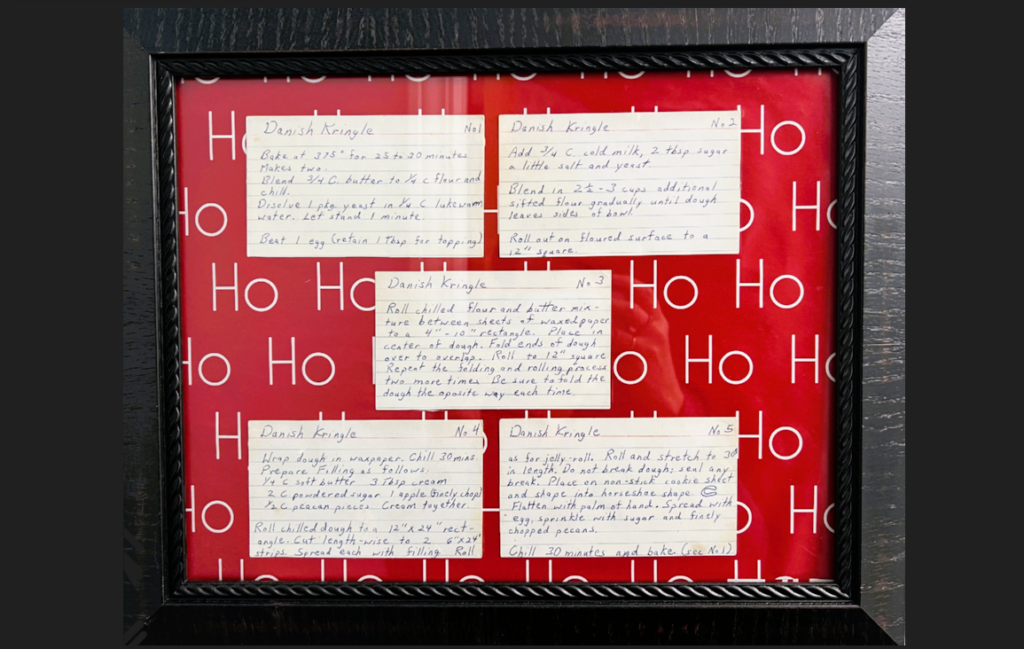
Or you may want to frame their handwritten recipe cards to hang on the wall as a holiday decoration.
On the other hand, you may choose to follow the example of those who have preserved their memories as “gravestone recipes” like those below!
Gravestone Recipes: Mom’s Christmas Cookies
Cascade Community Cemetery, Cascade, Iowa

Throughout her life, whenever someone asked Maxine Menster for her Christmas cookie recipe she said, “Over my dead body!” So her family let her take her joke to her grave by inscribing the recipe on the back of her headstone!
Do you have a favorite family recipe that will not be shared during your lifetime? One BillionGraves user said, “When it comes to my cornish pasties recipe, I always say ‘over my dead body’ to everyone except my kids.”

As a little girl in rural Iowa, Menster watched her parents bake cookies on Christmas Eve. Holes were poked in the top so they could hang them on the tree. The children were delighted to eat them on Christmas morning.
By the way, do you know what “oleo” is? One BillionGraves user said, “My mom asked my son to get her some oleo, he looked and looked and couldn’t find it. He asked an employee and they didn’t know what it was. So finally he called my mom, and she told him it was margarine. I just use butter.”
Gravestone Recipes: Chocolate Fudge
Logan City Cemetery, Logan, Utah, USA

When it came time to choose a lasting remembrance for Dr. Wade H. Andrews’ gravestone, there were lots of choices.
He lived in Logan, Utah where riding horses was a way of life. In World War II, he was a B-24 bomber pilot. Andrews valued education and earned a doctorate in sociology. As a member of The Church of Jesus Christ of Latter-day Saints, he was married in a temple for “time and all eternity” to his wife, Kay.

But it was his love of his wife’s chocolate fudge that filled the back of his gravestone, alongside a quote “Wherever she goes, there’s laughter”, and a list of their five children.

Do you know what “softball stage” is?
When cooking sugary syrup for fudge, you need to cook it until it reaches a temperature of 235 to 245 F. Of course, you can check the temperature with a candy thermometer, but if you don’t have one, drop a small spoonful of the syrup into very cold water. Then reach into the water to roll the cooled syrup into a ball.
If the syrup has reached “soft-ball stage”, it will easily form a ball while in the cold water that can be flattened once removed from the water. In other words, it is a “soft-ball”.
Gravestone Recipes: Spritz Cookies
Green-Wood Cemetery, Brooklyn, New York, USA

Visitors to Brooklyn’s Green-Wood Cemetery keep an eye out for a special treat – Naomi Odessa Miller-Dawson’s spritz cookie recipe.
As a girl, Dawson came from an eclectic kitchen. Her parents and her older sisters were born in Barbados so they cooked Caribbean Bajan dishes like peas and rice, kingfish, and coucou (similar to grits but made of cornmeal and okra).
The family gradually adopted all-American favorites like ham, pot roast, and hot dogs. And Dawson came to love baking. She especially loved buttery Scandinavian spritz cookies.

To make spritz cookies, the dough is loaded into a tube and then pressed out through round plates with holes in them to create a variety of shapes. They are often sprinkled with sugar when they are fresh out of the oven.

In Germany, these cookies are known as Spritzgebäck. Since the German verb “spritzen” means “to squirt,” the name of this cookie was shortened to “spritz”. It’s a tiny word that brings back generations of delicious memories.
Gravestone Recipes: Glazed Blueberry Pie
Mountain View Memorial Park, Lakewood, Washington, USA

Margaret Davis was born on the 4th of July in 1918. Her husband was born in September of the same year. Their gravestone is marked with a black marble bench and monument with symbols that indicate they served their community in several organizations.
She lived for 86 years and that left a lot of time to make her famous glazed blueberry pie.

Blueberries are now recognized as a superfood, packed with antioxidants, potassium, phytoflavinoids, and vitamin C.
Back in America’s colonial days, Native Americans crushed and dehydrated blueberries (which they called “star-berries”) and used the resulting powder to add nutritional value to their other foods all year long.
Historians speculate that the earliest North American settlers may not have survived their first winter in the new country without blueberries.
Gravestone Recipes: Chicken Soup

Gravestone Recipes:
The family of Valerie C. Volpe of West Seneca, New York, had her chicken soup recipe printed on her gravestone shaped like an open book – in her own handwriting, no less!
Valerie was co-owner of Valerie’s Family Restaurant. During her life, Volpe’s recipes nourished her family and her community. One family member noted that her “recipes will now live on forever”.

Chicken soup is considered one of the world’s healthiest foods, a folk remedy for colds and influenza. In many countries, it is considered a comfort food.
Here’s Valerie’s recipe:
Cut an “oven stuffer” into 10 pieces. Place in a pot. Rinse and cover with cold water. Add salt. Cut up 1 small parsnip, 4 carrots, 1 turnip, and 2 stalks of celery. Add to the pot and bring to a boil. Sprinkle with dill. Cook for 2 1/2 hours and then remove the bones. Top with chopped parsley when ready to serve.
Bon appétit!
Gravestone Recipes: Nut Rolls
Rehovot Cemetery, Rehovot, Israel
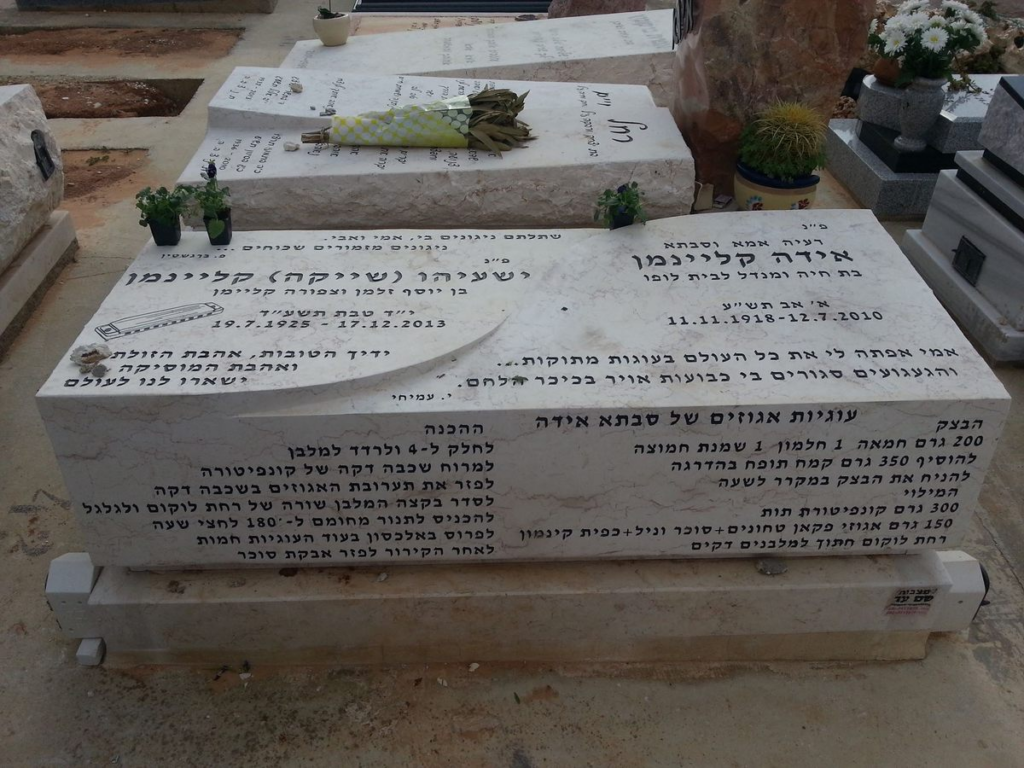
When Ida Kleinman baked a nut roll, she was all business. She carefully blended the strawberry jam, cinnamon, and chopped pecans.
As she rolled out the dough, she had her husband measure it with a ruler to be sure the dimensions were perfect.
Her exactness resulted in a nut roll that was so good that her family engraved her recipe on the front of their family tombstone. “She had ‘golden hands,’” says her son, Yossi, who still makes the treat today.

The recipe is engraved on the tombstone in Hebrew. But even those who cannot read the language can easily identify the Kleinmans’ gravestone by the harmonica etched on the top. It is in remembrance of her husband, Isaiah. He was a skilled musician who credited his harmonica with giving him the strength to survive the Holocaust.
When Yossi visits the gravesite, he sometimes stands nearby to watch others experience the gravestone recipe. One person might notice it and smile. Another may copy it on a sheet of paper, planning to try it out for themselves.
“This is what we wanted it to be,” he says. “People walk by and smile a little.”
Source: https://www.atlasobscura.com/places/grandma-idas-nutroll-gravestone
Taking Recipes to the Grave
While some hold tight to their culinary secrets, swearing to take them to their grave, others understand that their legacy lies in the recipe itself.
Many thanks to those who leave their recipes behind for the rest of us to share and enjoy!
One woman became a TikTok sensation by making the recipes she discovered on gravestones and delivering the food to the grave. Learn more HERE.
Recipe Interview Questions
Whether your recipes are on a gravestone or someplace else, preserving them will help keep your family history alive.
Here are some questions that can help your family to preserve your culinary memories:
- What is your favorite family recipe and why?
- Whose recipe is it? Did the person hand-write the recipe?
- Where is the original recipe now?
- Did you make it with this person?
- What does it taste like?
- What does it smell like?
- How long has this recipe been in your family?
- Is it connected with a particular culture or ethnicity?
- Is it part of a holiday tradition?
- When was the last time you ate it?
- What is the best part of the recipe, making it or eating it? Why?
- Are there any family stories connected with this recipe?
Click HERE for a blog post about genealogy interview questions for family Christmas gatherings.
RootsTech Global Cookbook
Psst! Here’s one more way you can share your family recipes. The world’s largest genealogy conference, RootsTech, will be held February 29 – March 2 in Salt Lake City, Utah. In connection with RootsTech, a global cookbook is being compiled.
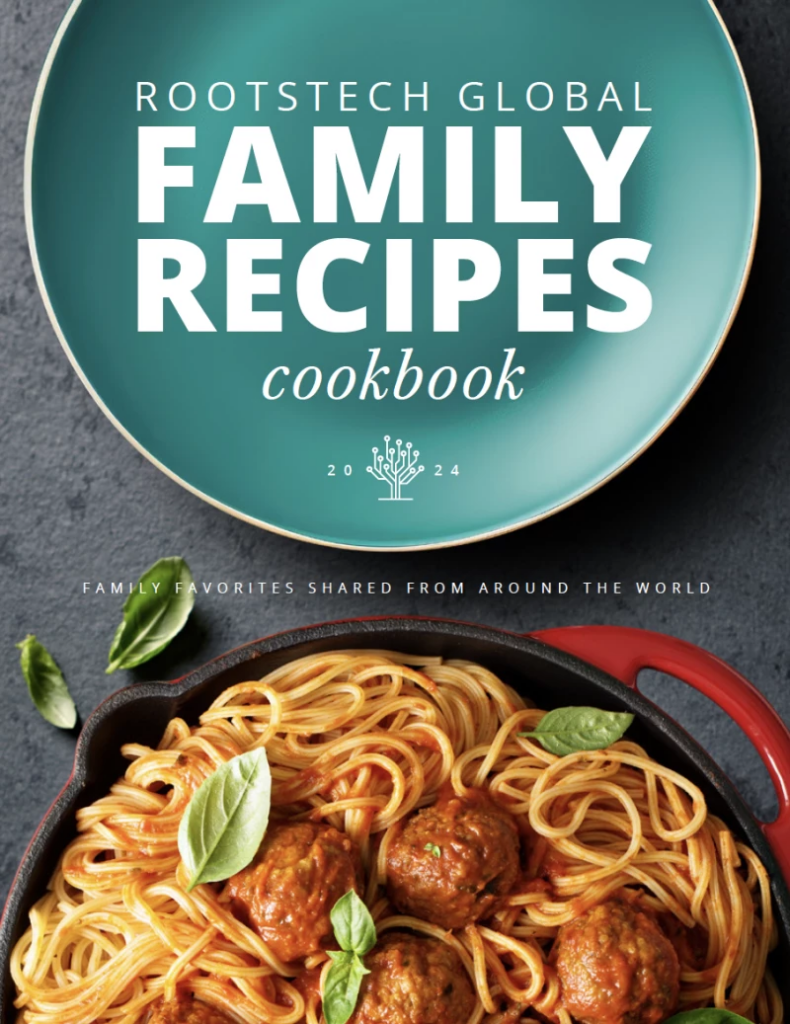
Click HERE to submit your family recipe for the global cookbook. Or click HERE to register for RootsTech so you can attend in person or online and purchase a copy of the global cookbook when it is published.
We need you!
We need your help with taking gravestone photos to help preserve history! When photos are taken with the BillionGraves mobile app, each picture is automatically tagged with GPS coordinates.
This allows families to easily find their ancestor’s final resting place at the cemetery so they can grow their family tree. It also allows future volunteers to see what has already been photographed and what still needs to be done.
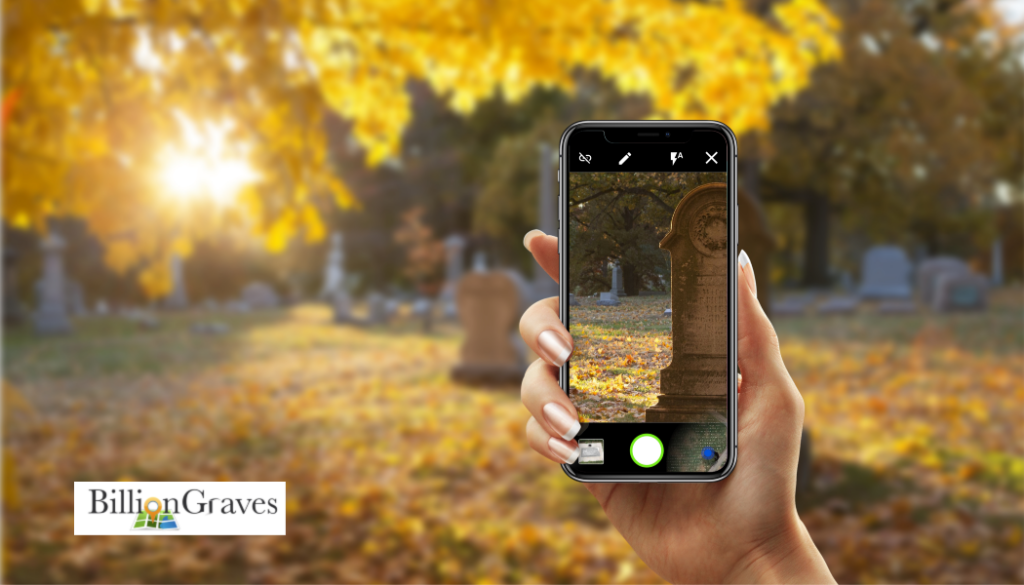
If you would like to volunteer to take gravestone photos with your phone click HERE to get started. You are welcome to take photos of gravestones at your own convenience, no permission from us is needed.
If you still have questions after you have checked out the resources above, you can email us at Volunteer@BillionGraves.com.
Would you like to lead a group in documenting a cemetery? Email us at Volunteer@billiongraves.com and we’ll be happy to send you some great tips!
If you find any gravestone recipes, please send them our way! 🙂
Happy Cemetery Hopping!
Cathy Wallace

